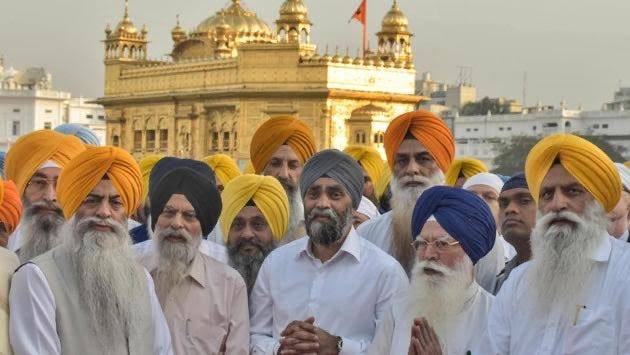Canada: Harjit Singh Sajjan Faces Flak Over Alleged Pro-Sikh Bias in Post-Taliban Evacuation
Harjit Singh Sajjan Faces Fresh Salvo Over Evacuation of Afghan Sikhs in Kabul Post-Taliban Takeover.
Harjit Singh Sajjan Faces Controversy Amidst Afghan Evacuation Efforts
a.) Emergence of Anti-Sikh Sentiment in Canada
The emergence of motivated anti-Sikh sentiment in Canada was today (27th June) directed towards former Defence Minister and current Minister for Emergency Preparedness, Harjit Singh Sajjan. The controversy is not centred around the Khalistan issue but rather his alleged prioritisation of the evacuation of Afghan Sikhs, a vulnerable minority community, during the post-Taliban evacuation in Kabul. Coming nearly three years after the alleged decision, this controversy appears to be driven by either narrow, parochial, and divisive domestic politics or part of a broader vilification campaign against Sikhs, or perhaps both. It needs to be called out by every rational Indian and Canadian, not just the Sikh community.
b.) Background of the Controversy
The recent controversy surrounding Harjit Singh Sajjan, Canada's the then Canadian Defence Minister, emerged from allegations that he prioritized the evacuation of Afghan-Sikh nationals during the chaotic fall of Kabul to the Taliban in August 2021. This controversy came to light through a report by The Globe and Mail, which cited military sources claiming that Sajjan had instructed Canadian special forces to rescue approximately 225 Afghan Sikhs. The allegations originated from three military sources who spoke to The Globe and Mail. These sources, who remained anonymous due to a lack of authorization to discuss the matter, claimed that Sajjan's intervention impacted the rescue of Canadians and other Afghans on Canada's priority list.
Nature of the Allegations
a.) Prioritisation of Afghan Sikhs
Sajjan allegedly instructed special forces to rescue about 225 Afghan Sikhs who were not considered an operational priority for the Canadian military as they had no direct link to Canada. This directive reportedly strained military resources and diverted efforts from screening individuals with Canadian connections awaiting flights out of Kabul.
b.) Sajjan's Response and Explanation
Harjit Singh Sajjan has stoutly denied the allegations, maintaining that he did not give a direct order to the Canadian Armed Forces to prioritize rescuing Sikhs in Kabul over other groups (video). Sajjan acknowledged that he relayed information from a Canadian Sikh NGO to the armed forces about the location and status of Afghan Sikhs eligible for rescue and resettlement in Canada. He insists that there was a strict protocol to first evacuate Canadian citizens and Afghan military interpreters, but Canada also had to respond to various other requests, including those for the Afghan women's soccer team and Sikh communities under direct threat. Sajjan denies that his actions hampered the ability of elite soldiers to evacuate Canadians and priority Afghans. He suggested that the scrutiny he belatedly faces might be influenced by his Sikh identity, stating that his actions would likely not have been questioned if he did not wear a turban.
c.) Support from the World Sikh Organization
The World Sikh Organization has supported Sajjan, dismissing the allegations as biased against his Sikh background and emphasizing the humanitarian duty to safeguard vulnerable groups like Afghan Sikhs and Hindus. The controversy highlights the complexities and challenges faced during the evacuation efforts in Kabul, as well as the sensitive nature of decision-making in such high-pressure situations. Sajjan's role and the broader context of the evacuation illustrate the difficulties inherent in balancing operational priorities with humanitarian concerns.
Official Reaction of the Canadian Government
The Department of National Defence affirmed that the military's evacuation operations adhered to government directives and were conducted in collaboration with Immigration and Global Affairs Canada. The official stance is that the evacuation prioritized vetted and vulnerable individuals, including Afghan Sikhs, within the coalition's efforts to ensure their safety through the air bridge operation. The Department emphasized that CAF personnel worked diligently in a hazardous environment to execute the evacuation plan, despite the challenges faced.
Sajjan's Controversial Amritsar Visit
a.) Diplomatic and Political Tensions
This is not the first time that Sajjan has been in the middle of controversy. The controversy surrounding Harjit Singh Sajjan's visit to the Golden Temple in Amritsar in April 2017 highlights a series of diplomatic and political tensions. During this visit, the then Punjab Chief Minister Captain Amarinder Singh refused to meet with Sajjan, accusing him of being a "Khalistani sympathiser" and claiming that five ministers in Justin Trudeau's government had Khalistani links.
b.) Allegations and Denials
These allegations of supporting Sikh separatism were strongly denied by Sajjan and refuted by the Canadian High Commission in India. Adding to the tension, pro-Khalistan slogans were raised by Sikh radicals during Sajjan's visit to the Golden Temple. The incident resulted in a diplomatic strain between Canada and Punjab, overshadowing Sajjan's efforts to focus on strengthening bilateral defence cooperation and expanding security partnerships. Sajjan attempted to downplay the controversy, stating he did not support the break-up of any country and emphasizing that his visit aimed to strengthen ties between Canada and India.
c.) Impact on Future Indo-Canadian Relations
Despite the controversy, Sajjan completed his visit to the Golden Temple and other parts of India, with the Canadian Government maintaining that the trip was productive and focused on enhancing bilateral relationships in various sectors. The incident, however, did impact future relations, as seen during Prime Minister Justin Trudeau's visit to India in 2018, where there was initial uncertainty about a meeting with PM Narendra Modi. Though a perfunctory meeting did materialise on the sixth day of his 8-day visit, the personal chemistry between Trudeau and Modi has been far from warm. However, through the G20 New Delhi Summit and the recent G6 outreach in Rome, Modi has consistently conveyed to Canada that there is "no space for those who misuse religion and promote separatism."
Canada’s Significance for Punjab
a.) Student Influx
Canada is a top destination for Indian students, particularly from Punjab. As of 2023, over 3.8 lakh Indian students (37% of all international students) were studying in Canada, with Punjabi students investing approximately Rs 68,000 crore annually in Canadian education. In 2022 alone, about 1.36 lakh Punjabi students went to Canada for their studies. The country offers attractive post-study work opportunities and pathways to Permanent Residency (PR), making it a favoured destination for those looking to settle abroad permanently.
b.) Sikh Population and Political Influence
Canada hosts the largest Sikh population outside India, with approximately 770,000 individuals, making up 2.1% of Canada's population, compared to 1.7% in India. Sikhs hold prominent positions in Canadian politics, including cabinet positions and leadership roles in political parties, making the Sikh community an important political constituency in Canada.
c.) Recent Policy Changes and Impact
Recent policy changes in Canada, such as capping international student intake, may significantly impact Punjabi students. The cap is expected to result in approximately 360,000 approved study permits for 2024, a 35% decrease from 2023. Despite these challenges, the large Punjabi student population continues to contribute significantly to the Canadian economy through tuition fees and living expenses.
4.) Diplomatic Tensions and Community Division
Diplomatic tensions have been a concern, with sporadic pro-Khalistan demonstrations in Canada leading to strains between India and Canada. The Indian Government has urged Canada to curtail "anti-India activities" and designate certain individuals as terrorists. However, only a very small minority among the Canadian Sikhs support the Khalistan movement, and for many in the Sikh diaspora, it is not a primary issue. Despite these issues, Canada remains a crucial partner for Punjab in terms of education, immigration, and as a home for a significant Sikh diaspora.
Summing Up
Internal Affairs but Global Reverberations
The controversy surrounding Harjit Singh Sajjan's actions during the Afghan evacuation appears more as an internal affair of Canada's domestic politics. The official government response, represented by the Department of National Defence, supports the position that the evacuation efforts followed established protocols and government directives. However, the fact that Sajjan, a serving Minister in the Trudeau Cabinet, is a turbaned Sikh and the allegations pertain to his having favoured the Afghan-Sikh community during evacuation, this has reverberations, if not repercussions, halfway across the globe in Punjab.
Diplomatic Strains and Optimism for Better Relations
Moreover, the gunning down of a self-styled Khalistan ideologue, Hardeep Singh Nijjar, in Vancouver and the subsequent irresponsible and unsubstantiated allegations by Canadian Prime Minister Justin Trudeau that Indian government agents were involved have further soured relations. Incidents like the anniversary of the Air India Kanishka flight bombing also create tensions within the Canadian community and between the two countries' diplomatic relations. Despite these challenges, there is cautious optimism for better relations. Canada, especially PM Trudeau, whose domestic popularity ratings are abysmal, would be well advised to rein in individuals on Canadian soil, whether citizens or not, from launching hate-India campaigns or secessionist movements, fostering a more collaborative and peaceful bilateral relationship.
If you believe this article would interest someone you know, please feel free to share it anonymously (for us), using any platform that you prefer.







Unbiased summary.
ਸਰਦਾਰ ਹਰਜੀਤ ਸਿੰਘ ਸੱਜਣ ਨੇ ਲਿਬਰਲ ਸਹੀ ਕੰਮ ਕੀਤਾ ਸੀ ਜੀ